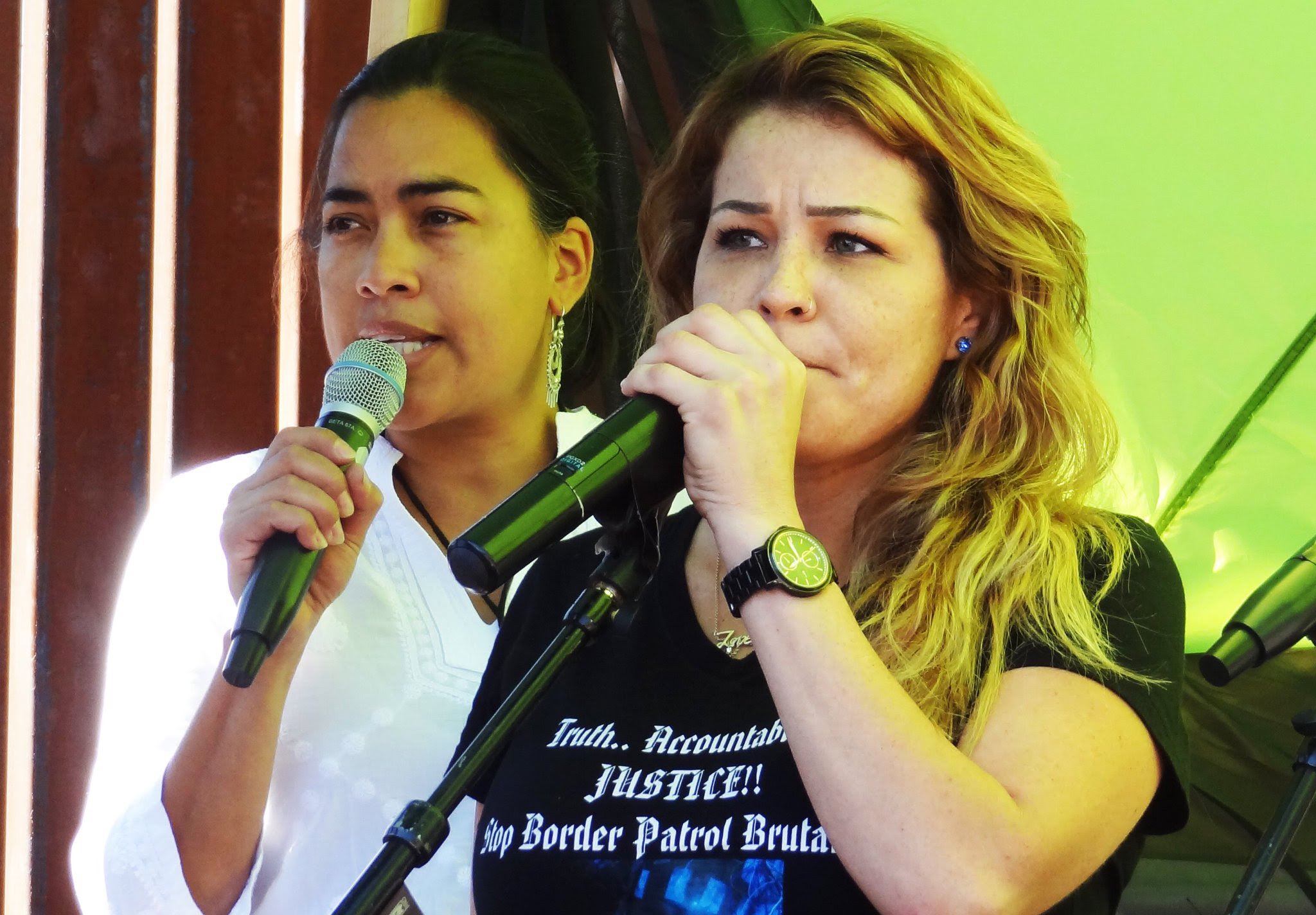From

At the heart of the 2016 School of the Americas Watch Encuentro is increasing awareness of the militarization of the US-Mexico border and Latin America, as well as the criminalization of migrants, asylum seekers, refugees and people of color. We moved our annual convergence this fall from the gates of Fort Benning, Georgia to the militarized US/Mexico border. The Convergence at the Border took place from October 7-10, 2016 in Nogales, Arizona/ Sonora, at the Eloy Detention Center and in Tucson, Arizona. The change of the location goes along with the broadening of the issue and our expanded fight against US militarization at home and abroad. Visit SOAW.org/border for photos, videos and more about this powerful encuentro, and read our report back (photos above and below, Steve Pavey): Friday, October 7 Hundreds of migrants, students, members of religious communities, veterans, and human rights activists gathered outside of the Eloy Detention Center in Arizona, to call for the release of the incarcerated migrants, for an end to profiteering of human suffering, and for justice for all. Speakers addressed the connection between US militarization in Latin America and forced migration to the United States, and described the horrors of living inside detention centers like private, for-profit CCA-run Eloy. “To those of you who don’t vote, who don’t change these laws, you are allowing children to die here inside places like Eloy,” spoke Berta Avila, a woman who was detained while pregnant, denied medical care, and who lost her child in detention. Following the moving speakers and songs of resistance, after the sun had set, the crowd processed closer to the detention center with candles and instruments. Inmates, who had organized on the inside, greeted those gathered on the outside by waving pieces of cloth and turning the lights in their cells on and off, while the crowd outside created a wall of sound, chanting, drumming and singing.
In the Nogales, Sonora side of the border, people came together from all across the Americas. Deported Veterans, the dance group Abya Ayala, migrant aid workers Las Patronas, the Mesoamerican Migrant Movement, Brothers on the Road, Border Patrol Victims Network and frontline communities in resistance demonstrated that the war has not been able to separate all our struggles. “The border is an open wound that we can only close with everyone’s help. Activities like this remind us that more than a region, we are a people injured but not defeated. We are a wounded but honorable people,” commented Ana Enamorado, member of the Mesoamerican Migrant Movement, who began her struggle after the disappearance of her son, Honduran national Óscar Antonio López Enamorado, in 2010 in Mexico. Saturday, October 8 Concurrent veteran-led marches led from both sides of the border to the US/Mexico border wall, where a rally with speakers and musicians bridged the high wall, and many marched from the US into Mexico.
Shena Gutierrez, from the Border Victims Network, spoke from the stage about the struggle to hold Customs and Border Protection agents accountable. In 2011, Shena’s husband, José Gutierrez, was brutally beaten by CBP agents near a port of entry in Southern Arizona. Since this tragedy, which her husband survived, Shena has become a spokesperson for border communities and victims of border patrol abuse, and inspires and educates border communities about their rights Also on Saturday, all day in Tucson, Frente X for International Liberation held a plenary, workshops and breakout groups for people of color (POC), re-imagining mutual solidarity against state-sanctioned violence, upholding racial and gender justice. The Encuentro provides a unique opportunity for those most directly impacted by state sanctioned violence in the US, Latin America, and other parts of the world to learn from one another, and begin building inter-racial, transnational solidarity networks. The moral necessity to make the Encuentro accessible to our undocumented family led us to create the POC Space in Tucson, AZ, where people are not forced to traverse a Border Patrol checkpoint in order to arrive.
Partner organization Puente leader Carlos Garcia held a powerful talk on Arizona’s War of Attrition on Migrants and Brown People, giving valuable context on how the crisis in Arizona came about. “When you talk about the territories we’re in, they’re O’odham territories, they are Yaqui territories,” said Garcia. “This was, is, and always will be indigenous land.” Garcia led us through the rise of anti-immigrant legislation and policies since the implementation of NAFTA in 1994, and the concurrent rise of community struggle and resistance that birthed the Puente movement into a force to be reckoned with, which recently was able to defeat 12 out of 13 newly proposed anti-immigrant laws. “We raise our fist and fight back, but we also have this open hand where we’re trying to counter-balance that attrition. When the state is trying to make your life so miserable that you self-deport, what is it that we need to do so that we’re there for each other, we’re supporting each other. We have our programs, we try to have health programs, community programs, know your rights workshops, anything that helps people feel like they don’t have to self-deport. So we’re stopping our people from being grabbed, put in cages, we’re trying to get them out of cages, and we’re also making them stronger and organised and making sure that they don’t leave.” Saturday afternoon we also participated in the Anniversary Vigil for José Antonio Elena Rodríguez (photo above, Steve Pavey) in Nogales, Sonora: starting with a march from the Plaza de las Palomas in Nogales, Sonora to the site where Jose Antonio was killed by Border Patrol forces and a mass with the Nogales Bishop. An interfaith ceremony at the border wall & candlelight vigil was held, and followed by an energizing cross-border concert featuring Charlie King, Colleen Kattau, emma’s revolution, Natalia Serna La Muna, Olmeca, Pablo Peregrina, the Peace Poets, and Son Jarocho. Sunday, October 9
We commemorated those whose lives were lost as a result of state violence with the traditional SOA Watch ¡No Más! No More! & Presentes at the border wall. Speakers included Shannon Rivers, a member of the Akimel O’odham tribe; Padre Prisciliano Peraza, coordinator of CCAMYN in Altar, Sonora; Carlotta Wrey, a founding member of People Helping People from Arivaca; Hector Aristizabal, Colombian human rights activist and torture survivor; Mariela Nájera Romero and Uriel Gamaliel Guzmán, Las Patronas; Marleny Reyes Castillo, Maria Guadalupe Guereca Betancourt and Araceli; Carlos Garcia, Puente; Frier Tomás González Castillo coordinator of La 72, Hogar Refugio para Personas migrantes y refugiadas, en Tenosique, Tabasco; George Paz Martin, peace and justice and climate activist and educator; and there were musical performances by Francisco Herrera, Natalia Serna La Muna, Gabino Palomares and others. (photos left and below, Steve Pavey) Following the ceremony at the border wall, more than 200 activists including Father Roy continued their demonstration in a march to the US Border Patrol interior vehicle checkpoint on the I-19 Monday, October 10 We joined the block party that was organized for the Indigenous People Day 2016 at the Global Justice Center in Tucson, Arizona. Our gathering this weekend reinforced solidarity and the realization that we are going to change the racist system of violence and domination. |








